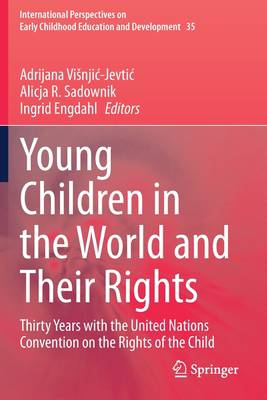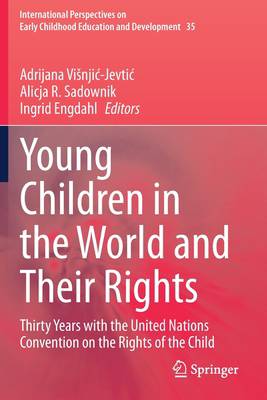
- Retrait gratuit dans votre magasin Club
- 7.000.000 titres dans notre catalogue
- Payer en toute sécurité
- Toujours un magasin près de chez vous
- Retrait gratuit dans votre magasin Club
- 7.000.000 titres dans notre catalogue
- Payer en toute sécurité
- Toujours un magasin près de chez vous
Young Children in the World and Their Rights
Thirty Years with the United Nations Convention on the Rights of the Child
Description
This book provides different perspectives on the concept of children's rights, including policy, educational, and children's perspectives. It examines how the crucial ideas of the Convention on the Rights of the Child are respected and implemented in 14 countries in five regions of the world. It looks at early childhood education, children's participatory rights, and at how these rights are promoted and guaranteed in different countries. It explores the professional practice of education and its complexities, challenges and dilemmas, as well as the role of play, and of listening and participation. The book advocates children's rights today, arguing for its vital importance, in the best interests of the children. In doing so, it furthers the understanding of children's rights and spreads knowledge about the Convention, as a means of celebrating its 30th anniversary.
The UN Convention on the Rights of the Child (UNCRC) comprises the potential to change the livesof children to the very best. It may exalt children from the position of marginalized citizens to the centre of policies all over the world. Even though the concept of children's rights is omnipresent, the respect for children's rights must be discussed. While the Convention brings the new perspective of children as citizens to the world, there are still challenges in its application. The book interrogates challenges in understanding and applying children rights and offers possible answers to these challenges. The ratification process itself, does not guarantee that children's rights are respected. While all adults should take responsibility for implementing the UNCRC in everyday life, Early Childhood Education should give opportunities for children to learn and live their rights.
Spécifications
Parties prenantes
- Editeur:
Contenu
- Nombre de pages :
- 273
- Langue:
- Anglais
- Collection :
- Tome:
- n° 35
Caractéristiques
- EAN:
- 9783030682439
- Date de parution :
- 22-04-22
- Format:
- Livre broché
- Format numérique:
- Trade paperback (VS)
- Dimensions :
- 156 mm x 234 mm
- Poids :
- 408 g






